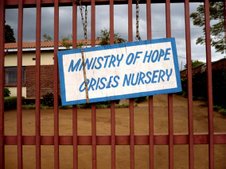I’ve noticed that the majority of the azungus we have met in Malawi are either involved in tobacco industry or in volunteering work. I did a bit of research on the Malawi Tobacco Industry (www.american.edu/TED/maltobac.htm) . It's long but quite interesting. I will work on the NGOs later.
 Malawi is confronted with many problems. It is considered one of the world's poorest nations, its economy remains weak, its external debt is 2.3 billion, AIDS is ravaging the population, and the average life expectancy is a mere 36.6 years. As if this were not enough, Malawi's environment is also in danger. Deforestation is considered the biggest environmental problem facing Malawi and the production of tobacco leafs for export its principal cause.
Malawi is confronted with many problems. It is considered one of the world's poorest nations, its economy remains weak, its external debt is 2.3 billion, AIDS is ravaging the population, and the average life expectancy is a mere 36.6 years. As if this were not enough, Malawi's environment is also in danger. Deforestation is considered the biggest environmental problem facing Malawi and the production of tobacco leafs for export its principal cause.* Malawi is estimated to be losing 3 percent of its forests every year and the direct link between tobacco production and deforestation is manifest - burning of fuel wood for the curing of the tobacco leaf, need for wood to construct curing huts (which need to be changed every 2 years) and of course need to clear land for cultivation.
* Deforestation in turn causes soil erosion due the loss of vegetation cover. Further, tobacco as a crop depletes the soil of important nutrients including nitrogen, phosphorus and potassium. All of this in turn decreases necessary habitats and threatens biodiversity.
*At the social level, deforestation and reduction in soil productivity means increased hardship for those in the rural areas as more and more time, energy, and inputs will be needed to do everything from cooking, growing food, and constructing buildings. Women and children absorb most of this burden.
*Malawi is also a nation suffering from severe poverty and malnutrition. There is an ethical issue of devoting so much prime agricultural land for tobacco exports while many people in this nation are hungry.
With all these negative issues associated with tobacco production, why does Malawi continue to rely so heavily on this crop? How can a nation justify supporting tobacco crops while ignoring the needs of its people?
Well Malawi is in serious debt and needs to earn foreign currency through the export of goods and/or services. The government sees tobacco production as the most effective means of achieving this objective.
The tobacco industry has been the leading economic sector in Malawi since independence. It is the nation's second largest employer after the government. Tobacco currently accounts for nearly 80% of the nation's export earnings.
The tobacco industry was intended to increase economic growth and promote development in Malawi. For many years, with the support of international donors such as USAID and the World Bank, the Government of Malawi has encouraged and provided incentives for the production and export of tobacco. Unfortunately, things have not gone accordingly to plan.
Tobacco prices on the international market have declined by 50% over the past 10 years. Industrialized nations, the main market for Malawi's tobacco (less than 2% of the tobacco produced in Malawi is used for domestic consumption), have been experiencing a consistent decrease in tobacco consumption with the increased awareness of the negative health effects of tobacco. This has been compounded by the recent devaluation of the currency (the kwacha). Not only have market prices gone down, but also the costs of inputs, such as fertilizers and pesticides, have gone up during the same period. This has had a devastating effect on the nation's ability to earn foreign currency.
The export orientation of the economy, the huge debt, the devaluation of the kwacha, the slipping global tobacco markets but also the increasing rate of deforestation, the high population growth rate and continued poverty paint a very bleak picture for Malawi.
Malawi must decide if it should focus on the current need to gain foreign currency, ignoring the possible environmental implication, or if it should be more forward looking and plan a more sustainable development approach, even if that means less money in the short-run. If current trends continue, deforestation will reach the point where the decreasing tree resources will impede not only tobacco production but will also interfere with such essential needs as fuel for cooking and timber for construction.
Tobacco, a crop that was once seen as Malawi's key for development, is actually leading this African nation to its demise...

Tonight is the non official opening of the Kumbali Cultural Village. Here is a picture of Johanna and I... helping behind the bar! Behind us, Fire... our boss for the night...



1 comment:
haha, your boss, thats me on the picture!
x Feye (feye@younginprison.nl)
Post a Comment